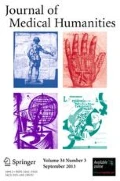Abstract
The authors conducted a baseline survey of baccalaureate and graduate degree health humanities programs in the United States and Canada. The object of the survey was to formally assess the current state of the field, to gauge what kind of resources individual programs are receiving, and to assess their self-identified needs to become or remain programmatically sustainable, including their views on the potential benefits of program accreditation. A 56-question baseline survey was sent to 111 institutions with baccalaureate programs and 20 institutions with graduate programs. Respondents were asked about three areas: (1) program administration (managing unit, paid director, faculty lines, paid staff, funding sources); (2) educational program (curricular structure, CIP code usage, completion rates); and (3) views on accreditation for the field. A clear majority of respondents agreed that some form of accreditation or consultation service could address resource and sustainability issues. Overall, the survey responses to staffing, curricular structure, and support suggest the need for developing a sustainable infrastructure for health humanities.

Data Availability
Deidentified data that support the findings of this study are available on request from Craig Klugman (cklugman@depaul.edu). The data are not publicly available due to their containing information that could compromise the privacy of research participants.
References
AACU (American Association of Colleges and Universities). n.d. “High-Impact Practices.” Trending Topic. Accessed September 29, 2022. https://www.aacu.org/trending-topics/high-impact.
AAMC (Association of American Medical Colleges). n.d. “Curriculum Topics in Required and Elective Courses at Medical School Programs: Medical Humanities, 2015–2018.” Curriculum Reports. Accessed October 7, 2022. https://www.aamc.org/data-reports/curriculum-reports/interactive-data/curriculum-topics-required-and-elective-courses-medical-school-programs.
Barrish, Phillip, Hunter Davidson, Cheney Melton, Ross Michie-Derrick, and Madai Montes 2020. “US Health Humanities Graduate Programs.” University of Texas at Austin Humanities Institute. Accessed April 20, 2021. https://liberalarts.utexas.edu/humanitiesinstitute/humanities-health-medicine/hhm-resources/us-health-humanities-graduate-programs.html.
Berry, Sarah L., Anna-leila Williams, Erin G. Lamb, and Craig M. Klugman. 2023. “Evolution in Health and Medical Humanities Education: A Proposal for Accreditation.” BMJ Medical Humanities 49:134–38. https://doi.org/10.1136/medhum-2021-012377.
Brinkley-Etzkorn, Karen E., and India Lane. 2019. “From the Ground Up: Building a System-Wide Professional Development and Support Program for Academic Department Chairs.” Studies in Higher Education 44 (2): 571–83. https://doi.org/10.1080/03075079.2017.1389877.
Gowda, Deepthiuman, Tayla Curran, and Dorene F. Balmer. 2019. “Mixed Methods Program Evaluation.” In Research Methods in Health Humanities, edited by Craig M. Klugman and Erin Gentry Lamb, 304–20. New York: Oxford University Press.
Harper, Betty J., and Lisa R. Lattuca. 2010. “Tightening Curricular Connections: CQI and Effective Curriculum Planning.” Research in Higher Education 51:505–27. https://doi.org/10.1007/s11162-010-9167-2.
HHC (Health Humanities Consortium). 2022. “About.” Health Humanities Consortium (website). Accessed October 2, 2022. https://healthhumanitiesconsortium.com/about/.
Holtem, Brooks, Yehuda Baruch, Herman Aguinis, and Gary A. Ballinger. 2022. “Survey Response Rates: Trends and a Validity Assessment Framework.” Human Relations 75 (8): 1560–84. https://doi.org/10.1177/00187267211070769.
Howick, Jeremy, Lunan Zhao, Brenna McKaig, et al. 2022. “Do Medical Schools Teach Medical Humanities? Review of Curricula in the United States, Canada and the United Kingdom.” Journal of Evaluation in Clinical Practice 28 (1): 86–92. https://doi.org/10.1111/jep.13589.
Jones, Therese, Michael Blackie, Rebecca Garden, and Delese Wear. 2017. “The Almost Right Word: The Move from Medical to Health Humanities.” Academic Medicine 92 (7): 932–35. https://doi.org/10.1097/ACM.0000000000001518.
Klugman, Craig M. 2018. “Medical Humanities Teaching in North American Allopathic and Osteopathic Medical Schools.” Journal of Medical Humanities 39:473–81. https://doi.org/10.1007/s10912-017-9491-z.
----. 2019. “Surveys.” In Research Methods in Health Humanities, edited by Craig M. Klugman and Erin Gentry Lamb, 287–303. New York: Oxford University Press.
Lamb, Erin Gentry, Sarah L. Berry, and Therese Jones. 2021. Health Humanities Baccalaureate Programs in the United States and Canada. Cleveland, OH: Case Western Reserve University School of Medicine. Accessed March 3, 2023. https://case.edu/medicine/bioethics/sites/case.edu.bioethics/files/2021-05/Health%20Humanities%20Report%202021.pdf.
----. 2022. Health Humanities Baccalaureate Programs in the United States and Canada. Cleveland, OH: Case Western Reserve University School of Medicine. Accessed September 20, 2022. https://case.edu/medicine/bioethics/sites/case.edu.bioethics/files/2022-07/2022%20Baccalaureate%20HH%20Report%20FINAL_0.pdf.
NCES (National Center for Education Statistics). n.d. College Navigator. Accessed March 3, 2023. https://nces.ed.gov/collegenavigator/.
----. 2020. “Detail for CIP Code 51.3204.” The Classification of Instructional Programs. Accessed August 23, 2022. https://nces.ed.gov/ipeds/cipcode/cipdetail.aspx?y=56&cipid=91797.
Schwinghammer, Terry L., Tobias E. Rodriguez, George Weinstein, et al. 2012. “AACP Strategy for Addressing the Professional Development Needs of Department Chairs.” American Journal of Pharmaceutical Education 76 (6): 1–8. https://doi.org/10.5688/ajpe766S7.
Acknowledgments
The authors would like to thank our respondents for participating in the survey. We also thank the Steering Committee of the Health Humanities Consortium for its input on the survey.
Author information
Authors and Affiliations
Corresponding author
Ethics declarations
Conflict of Interests
The authors have no relevant financial or non-financial interests to disclose.
Ethics Approval
The survey was declared exempt by the Institutional Review Boards at DePaul University (January 2022) and Creighton University (February 2022).
Additional information
Publisher's Note
Springer Nature remains neutral with regard to jurisdictional claims in published maps and institutional affiliations.
Endnotes
1 CIP data are collected for all programs in federally funded public and private educational institutions several times a year. These data include demographic information about students, enrollment, completion rates, staffing, program/institutional resources, financial aid, and selected student financial status data, among other data.
2 The NCES defines CIP code 51.3204 as “A program that explores the ethical, historical, literary, philosophical, and religious dimensions of medicine or health. Includes instruction in art, cultural studies, economics, ethics, history, literature, medical anthropology, philosophy, religion and spiritual thought, science and technology, visual art, and writing” (NCES 2020). This definition is not prescriptive and may include other elements in various programs. Programs elect to adopt a CIP code with institutional administrators. The decision is up to reporting institutions, not NCES.
Rights and permissions
About this article
Cite this article
Berry, S.L., Klugman, C.M., Adams, C.A. et al. Health Humanities: A Baseline Survey of Baccalaureate and Graduate Programs in North America. J Med Humanit 44, 463–480 (2023). https://doi.org/10.1007/s10912-023-09790-5
Accepted:
Published:
Issue Date:
DOI: https://doi.org/10.1007/s10912-023-09790-5

